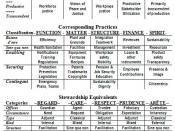'Many companies have been criticized for their apparent lack of social responsibility and their reluctance to account for their social activities' (Henderson & Peirson, 1995: 927). In general, social responsibility is 'an obligation, beyond that required by the law and economics, for a firm to pursue long-term goals that are good for society' (Robbins, et al., 2000:165). In other words, social responsibility is doing the right things and have social moral in an organization (Schermerhorn, 1996:119).
Ethics in business concentrates on people that 'conduct themselves in an effort to fulfill the ethical requirements of their business lives' (Rashid & Shariff, 1996: 42). There are a set of wrong and right conduct, demeanor, judgment of a special affair in dealing with others involved in a similar activity or business (Rashid & Shariff, 1996: 42).
This essay will analyze the statement, which is social responsibility is defined as the organization's obligation to engage in activities that protect and contribute to the welfare of society.
This essay is divided into three parts to illustrate the statement. Firstly, the brief description of classical view and socioeconomic view will be introduced. Secondly, the comparison between these two views will be discussed. Lastly, the examples, which relate to the two views of social responsibility will be given.
Academically and public policy circles, social responsibility consists of two contrasting views: classical view and socioeconomic view. These two opposing views have different opinion about the social responsibility. The former one believes that 'management's only responsibility in running a business is to maximize profits' (Schermerhorn, 1996: 115). In contrast, the later one holds that 'any organization must be concerned by the broader social welfare, and not just for corporate profits' (Schermerhorn, 1996: 116).
The classical view is supported by Nobel laureate Milton Friedman, a respected free-market economist (Robbins,


